“Putting Human Life Above Political Rhetoric” – Interview With WHOSE STREETS? Directors Sabaah Folayan & Damon Davis
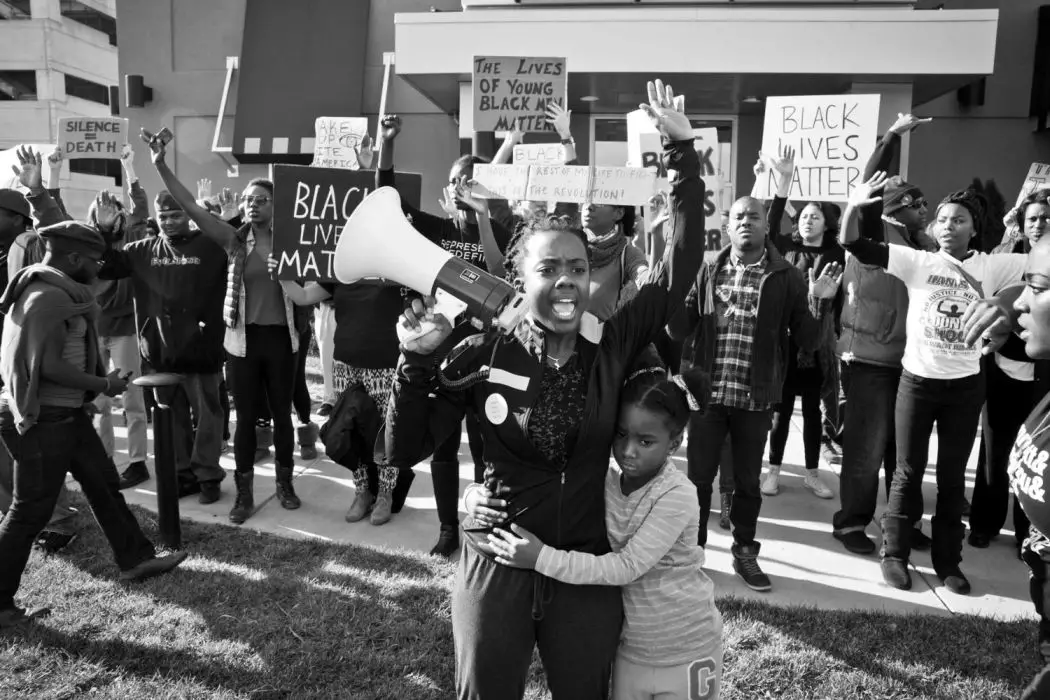
Arlin is an all-around film person in Oakland, CA. He…
Though it’s a problem that has been with us the entire history of this nation, within the past few years police murders of unarmed black men has become one of the most divisive issues in America. With smartphones allowing everyone being a potential video journalist, this sad truth has become inescapable for the entire country, not just those communities fated by centuries-old institutions to experience it first hand.
The issue arguably reached a fever pitch in August of 2014, Michael Brown was murdered by in Ferguson, Missouri by police officer Darren Wilson, an event that supercharged an already burgeoning national movement. The new documentary Whose Streets? chronicles the aftermath of that tragedy, but unlike many cable news stations, the filmmakers stayed embedded in the community after the initial protests had subsided to meet the individuals who are making the movement happen.
Co-Directors Sabaah Folayan and Damon Davis were kind enough to sit down and discuss their film with me when they were in town this past April for the San Francisco International Film Festival.
Interview with Sabaah Folayan & Damon Davis
Arlin Golden for Film Inquiry: The film starts with the protests immediately following Mike Brown’s murder. Can you tell me how you came to the scene in Ferguson? Did you know you wanted to do this project as soon as you heard the news?
Sabaah Folayan: I was working at a non-profit and my contract was over at the end of August. That summer I had been just thinking about my own life path; I was pre-med and not really satisfied, and so I started to look up public health, which is how I ended up at this non-profit. I had watched the conflict play out in Palestine all summer and had seen different sources, the reporting, or lack of reporting in the mainstream media, I had been watching Democracy Now and other sources like that that where on the ground there, and seeing the discrepancy in that narrative was really frustrating to me. I was posting on social media and people were really responding. I think that me looking for my professional path and getting that feedback when Ferguson happened, I wanted to correct that narrative somehow.
So initially what I wanted to do was do enough research to have grounds for a public health study, and the hypothesis was that people and police facing off day after day was going to have a long-term, PTSD effect throughout the entire community. So I went there, I had printed out these packets, these questionnaires I was going to ask, and it was not the setting to that kind of clinical interview. So, you know, I started writing, my DP was taking photographs, and still didn’t feel like we were capturing what we were really experiencing, trying to keep up with this news cycle (I’m not a journalist), so that’s when we started recording and asking questions. It was our first interview that’s – actually the first scene in the film is pulled form that – when we were like “ok, we need to continue to follow this story, we need to continue to film”. And that was about probably a month and a half into us coming back and forth to Ferguson.
So it was a totally organic process; I didn’t have a filmmaking background. It was just a desire to reposition the conversation and to have it from a place of…putting human life, human well-being above political motives and rhetoric. So that’s what motivated it. And then, I felt like the right way to do it was to do it in collaboration with someone from there, because I think a big part of the way that the point was missed and then the narrative was misconstrued was because nobody that who was really really embedded and accountable to that community had a real voice in constructing that narrative.
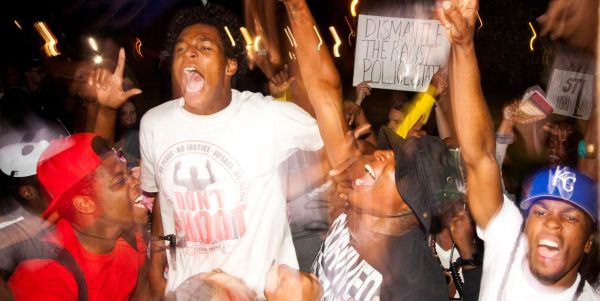
So I felt like, if we were going to do this we needed to do it in partnership with at least someone from the community. We offered everyone who we were interviewing…we were like “you can be as involved as you want to in this project” and most people just wanted to give us an interview. And people continued to refer us to Damon, who’s a really well-respected visual artist in that community and he wanted to do his own film project, and we just organically came together.
So that’s how you decided to pick up the camera, and went from the public-health project to a film? Was meeting Damon?
Damon Davis: No no no, I’m pretty sure I was later in the game.
Sabaah Folayan: Yeah, we had been filming for like, three months, so we started filming, but during that first three months of filming we were looking for collaborators behind the camera.
Damon Davis: And I was trying to get a film project going off on my own to do, you know, and mine was a little bit different. I wanted to do a trans-media sort of thing, but still make a film by the people for the people, from St. Louis and Ferguson. And I was directed to them when I was looking for footage, and I knew that they were shooting. A bunch of people tried to put us together then. But before that, they were working on a project with kids, to empower kids and put cameras in their hand.
It was just a lot of people, and a lot of dots, it was like we were just barely missing each other, and then eventually we got together. I curated an art show in St. Louis, and Sabaah, Lucas [Alvarado-Farrar], who is now our cinematographer, and Simone [Varano] who is assistant editor, they all came. And we actually finally saw each other in person, and talked. And then from there, she was calling it a “courtship”, it took a couple of months and then we were like “ok, let’s do this”. And we’ve been rolling ever since.
For sure, glad you guys found each other.
Damon Davis: Yeah, me too.
So aside from the footage you guys shot, there’s a lot of iPhone, citizen-journalist type stuff in the film. How do you go about curating that, and picking what you want to use, and adding that to your own narrative?
Sabaah Folayan: Well, I really have to give credit first to our archival producer, Mridu Chandra, who helped us to navigate all of that, all the different resources, particularly the news media and the licensed footage. We waited until post-production to do all that research, which I don’t recommend anyone do.
Damon Davis: [Laughing] That’s just ridiculous. Like every time we say it now, it’s like… that is ridiculous.
Sabaah Folayan: It’s crazy that we did that. But we were really rooted in the personal character stories that you see in the film. And so, the kind of architecture of this movement and the protests on the ground were something that we laid in afterword. And our assistant editor Simone Varano was really instrumental in just going through all that and pulling out the best moments.
And Chris [McNabb] did an incredible job of creating a sense of space and place out of these really disparate types of shots. But it was an overload of information. We waited because we were like “oh this is Ferguson, everyone covered it, it’ll be easy to find footage”. And it was wayyyy more information in that process, it just took a lot of hours of watching through. The editors on this project have had really good instincts about what are the moments to use, what are the moments that are going to bring out this story.
Does that wear on you guys, going through all that footage? I mean, you’re already there on the ground, but to see the same angles, or the same things from different angles all the time…
Damon Davis: And not even the same things, but the pain and the violence that got put down on us, like, we’ve got to watch that over and over again, and it doesn’t go away. And where some people can have closure and try to move on with their lives, we’re still looking at it years later. That’s the hardest part for me. But like she was saying, that’s nowhere near the editors. They had to look through every. single. second. There’s no comparison, they had it a lot harder.
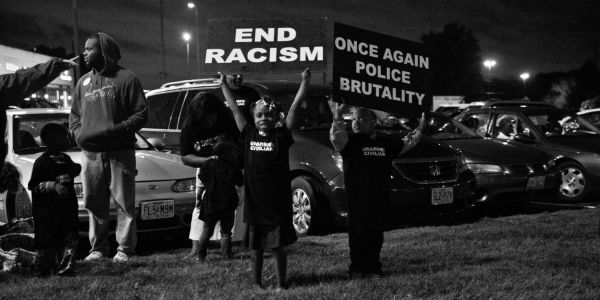
It was just hard for me personally, I think I speak for both of us, because that shit happened to us for real. You don’t want to keep re-living certain things, you know? There were even time where I wasn’t physically out there that day, but I can feel being back there; the time, and the anxiety, the fear, and the anger, you know? It’s like over and over again.
Geez. So going off from that, you spent the film pretty much exclusively with the activists and their families, save for Darren Wilson’s interview with George Stephanopoulos. I’m wondering if you would talk about why you made that decision to include that interview?
Sabaah Folayan: Yeah, so during production we interviewed the mayor a couple of times, we interviewed the chief of police, we interviewed retired officers, city managers, a lot of different public officials, and we found that they all pretty much stuck to the same script, and we weren’t getting responses from any kind of human place. And you can just tell, you can tell when somebody is giving you a sincere answer from the heart or when they’re giving you talking points.
So we were first and foremost trying to tell a human story, to take it out of the realm of political rhetoric and bring it down to something that was about people. It was a debate throughout the edit about whether or not to even include Darren Wilson, do we mention his name? How deep do we go? Because we didn’t want to make this film be about one bad cop, or one bad apple. So using that interview was something that we decided on a bit later in the process, and it was really, I think for me more so, part of a media critique we were trying to level, in terms of the way that the status quo goes uninterrogated.
So our hope was that we could build this world, which is reality according to the people on the ground, so that when you get to that point of hearing the person whose actions sparked all of this, and you hear him give those talking points and those wrought answers, you hear how absurd it sounds in the face of everything that has happened.
And also, we didn’t want to demonize anyone, although we have our own perspective and our own side to the story, we felt like just putting people’s humanity up against each other. You know I think he probably really believes the things he’s saying. I’m not sure. But, you know, I think we just wanted to have that juxtaposition; we felt that if we could bring people deep enough into that world of the community of St. Louis, that when we showed that interview they could see that interview through the eyes of the people who had lived through this, and that it would look a little bit different than maybe the first time it had played on television.
Damon Davis: Yeah, I agree. And I really want to emphasize the part about how systematic, and… how it’s not just one bad apple. Because if you watch the footage around that particular thing, you see how all these cops are dedicated to supporting him, no matter what. When you hear those talking points you know that there’s somebody that gave them those talking points. So there were a bunch of people facilitating this situation, and I think that that was a huge thing for me.
The way we dropped that in, that shows you that we’re not fitting to let the rest of them off the hook because Darren Wilson is the one that actually pulled the trigger, when all of them helped to pull the trigger, and they helped to keep the iron curtain up of looking as though they were in the right, and he’s in the right, and protecting him at all costs, you know what I mean? Putting all their resources into protecting this one dude. Because if he comes down it brings down the whole charade, you know?
Yeah, definitely, and I really feel your point about recontextualizing that interview within the film, because…there’s a line at the end where George Stephanopoulos asks something like “What do you want?” and he’s like “I just want to live” and like, you just want to bury your head
Sabaah Folayan& Damon Davis: Yeah!
…And be like, that’s what everybody else wants!
Damon Davis: Especially that kid, that’s what he wanted.
So, there’s a really brief scene during one of the protests where a camera crew gets gassed, and then you see the police show up and break down their gear. Did you guys ever find yourselves targeted by the police during filming?
Sabaah Folayan: (sighs) yeah…
Damon Davis: Yeah, we had a very interesting situation. This was maybe what, like a year in? After everything?
Sabaah Folayan: Mm-hmm.
Damon Davis: We would keep coming back to shoot more, you know? And one time we were just shooting B-roll at the Fergusson PD with one of our main characters and just our small fours person crew. And I drove, and we were sitting in the van that we use, and we had the top up in the back so they could grab stuff out and go shoot some B-roll. So it’s me, Sabaah, and one of our subjects, just sitting there, talking. And then a flash goes of, and I’m like “did one of y’all just take a picture?”
And then we look back and there’s an unmarked Explorer with a dude hanging out of it taking pictures of us. It’s unmarked in the front. So when they pull out, I get out of the car to close the thing, you know, and then they sit there for a while, they want us to see them. And when they pull off, there’re federal government plates on the back. Yeah! And it’s just so they can show themselves and let you know that “we’re watching you and we know who you are”.
And that ain’t Ferguson police, that’s the thing, those were federal vehicles. And they kept taking pictures of us. They drove out – we were sitting on a fast food lot – and they just kept snapping pictures of us as they left. That’s just intimidation I guess. “Just so you know, that we know who y’all are, just as much as you know who we are”. That sort of thing.
You said that they were the federal police, do you feel like they were directed to do this by…
Damon Davis: I don’t know, but you understand that the federal government was there because of Holder, and they didn’t leave, so they were still there. You know, they could say that “anybody that’s out there in front of the PD taking pictures…” stuff like that. But there was no protest, we were just shooting B-roll, you know? And I just…history has taught me that whenever black people stand up, the loudest ones are always under surveillance, you know what I mean? Always being watched. And I think the louder you are and the more potential you have to get louder…that’s when they show themselves to you, you know what I mean? And I would be a fool to just brush it under the rug. It’s a real thing, and we ain’t the first and we ain’t the last.
Right. So I want to talk about just, since you’ve made the film you’ve had your premiere at Sundance. Going through that whole rigmarole, first time feature director, and you came out with a distribution deal with Magnolia. Could you go through that kind of crazy meat market process?
Sabaah Folayan: Yeah. You know, we worked, we edited down to the wire. So it was a very strange transition to go from being immersed in this creative process, it’s very familiar, you know, the team, we’re like family by this point. And then to all of sudden just be exposed. Like it felt very naked and it felt very…you know, it’s commercial, the bottom line…such a far cry from why we actually started doing this project. But yeah, I mean…
Damon Davis: That’s It!
Sabaah Folayan: It’s crazy!
Damon Davis: That’s it. “It’s such a far, far cry” is a great way to put it. It’s like, it’s accelerated to a degree. It’s like, we’re going to other film festivals, and only know we realize, “that’s crazy”, ’cause that was the first one we did. So everything after that is like…we were thrown in the deep side of the pool. So now, this is nowhere near as hectic. It was just so much, and it was on top of us trying to deal with regular life that was going out on there…so it was ridiculous, it was just outright ridiculous. The level of “awake” you had to be on at all times.
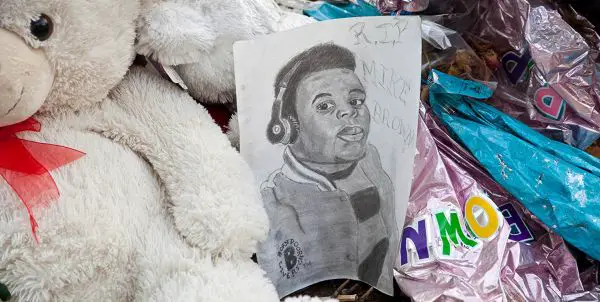
Sabaah Folayan: And I think that on the other side of it though, for me Magnolia, even going into it, was the distributor I would have hoped for, honestly. So for them to want our film felt very synergistic, and they’ve been committed thus far to our impact goals outside of just the commercial bottom line and they have a really good understanding of our priorities and include us in the creative process as far as the key art, and the strategy, and picking the date, and I think that’s rare as far as distributors go.
Our experience is definitely rare in terms of what other filmmakers go through when they connect with a distributor. Even being at Sundance, it’s a bit of a Hollywood environment, it’s a bit of a commercial environment. But I think the time when we premiered, it was the weekend of Trump’s inauguration, it was the same time as the Muslim ban, and people were really really receptive to it. People were coming to us throughout the festival and thanking us.
And while it was overwhelming, it was absolutely the best case scenario. I mean, The Guardian pointed out a Frederick Wiseman reference and I was just so honored. Because not only is that amazing, but also Hospital, and his kind of stylistic approach to looking at a huge institution through these really really specific anecdotes in kind of this dispassionate way was really inspiring to me personally. So to put something into your work and then hear it come back to you from people consuming it, that’s the dream as an artist, so we’re just very very grateful for these opportunities.
Damon Davis: Definitely.
Yeah, Magnolia’s doing great, they killed it last year.
Damon Davis: They’re also respect the narrative we’re building around the film and around ourselves, that’s the other thing. They’re listening to how we interact with each other, and they’re not coming in and…there’re certain people that try to put wedges between the two of us, different shit like that. And maybe we’ve just practiced that and now we won’t let anybody do that shit. But they just really respect us, I feel respected when I go in there and talk to them.
Why do you feel like people were trying to do that?
Damon Davis: I don’t know, that’s the world, man. (laughs) Like, I ain’t got the answers for it but I know definitely it has occurred, you know?
Sabaah Folayan: Yeah, I think that’s something that’s tough with co-directors.
Damon Davis: Yeah. They expect it.
Sabaah Folayan: They don’t expect cohesion, and love, and care.
Damon Davis: To actually like each other or to respect each other. And so being used to that, people try to play on that to put themselves in a position, you know? And that’s not exclusive to filmmaking either. Some human beings are those type of people.
No doubt. So now you have the deal, you’re doing all these fests…how do you guys try to cross the divide to get the film seen by people who don’t go to fests, who don’t go to theaters for documentaries, you know, that say “all lives matter” or “blue lives matter” or whatever, how do you get those people to see the film?
Sabaah Folayan: So, the divide is an interesting one. Terence Nance, who I really respect a great deal, did a presentation at Sundance, and he pulled the top trending music acts, and the the films, form different streaming apps. And he pointed out the way in which black culture completely dominates music, and it’s virtually absent in film. And so going to festivals, you know, I think that depending on where we are, there are probably some “all lives matter” folks in those audiences. There are much more “blue lives matter” people in the audiences than there are black people in the audiences.
I think that this film was intentionally made to have a double meaning. I think all the media that we consume actually has a double meaning depending on which angle you’re looking at it from, because we have such a segregated society, we are looking at things from different perspectives depending on who we are. So for black people, for people of color who experience oppression, this film is meant to be a validation, an homage, a vindication, a testament to the fact that “yes, your experiences are real. Yes, they’re happening, they’re not just happening to you. Yes, they are wrong.” Because everything, every other source of media is saying “if you thugs just stopped committing crimes against each other, everything would be fine”.
So that was our #1 priority; to provide that cathartic experience, to place this struggle in the context of family, love, in the context of community, to show dignity in resistance. And think that, you know, people say “don’t preach to the choir”, but I think that a choir that’s in harmony is very important. If the choir is not in harmony, then they may need to be preached to. So I’m satisfied with bringing a deeper level of communication to people who maybe are on our side, but they don’t understand our exact rhetoric as black people. Or they may consider themselves “liberal”, but this is their line. Or they just don’t know what really happened.
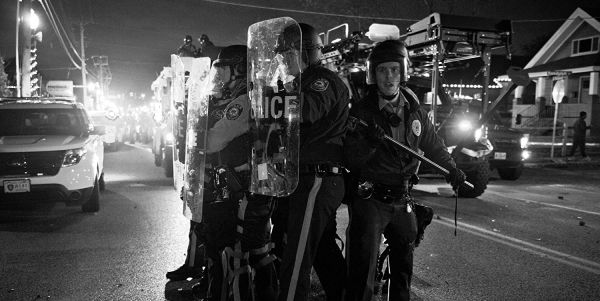
So for me personally, I’m content with that, because I believe that a small group of dedicated people can change history. And I think that some of the fallacies and the illogical beliefs that people hold as far as saying something like “blue lives matter”, well, a uniform is not a skin. Police is not a human identity, it’s a function, it’s a profession, and they’re really intended to be servants of the law, they’re intended to enact the law, and the law is intended to protect all of us, and it’s not really doing that. And that’s a problem. But I don’t think that appealing to people that say “blue lives matter” is necessarily the next step to solving that problem.
I firmly believe a small group of dedicated people can change history, and I hope that this film can contribute to a solidification of people who are already on the side of justice, and peace, and the value of human life. A validation and a reaffirmation of those people at a time where it looks pretty grim.
So I’m getting the five-minute warning, and I just have one question left, but it’s probably more like a half hour question. After your experience making this film and being embedded in the movement, do you have any sense, or has your sense changed at all, why you think people even become police officers in the first place?
Damon Davis: Yeah, that could take a while. (laughs) I didn’t know when I started, and I still don’t know, I know less, after seeing the way things operate, you know? Why do they stay police, too? That’s another thing. If you came in and you thought you were going to be a superhero, then you see how it really works, and you stay there…that’d be the real question. That’s the real question I got for a lot of people, and I have law enforcement in my family, and they can’t explain it to me. Yeah, that’s going to take us a while, that’s the abridged version.
Sabaah Folayan: Yeah, I mean, you know, I think people do it for different reasons. I think when you have like, third, fourth, fifth generation cops…
Damon Davis: That’s one thing.
Sabaah Folayan: Then there’s a high possibility that you have an unbroken chain of racism. Because when cops were started it was to keep black people under control as they were escaping slavery. So I have my trepidations about police officer who do it because it’s in their family. And I think that’s a big part of the kind of sense of nobility and purity of this profession that people have in their minds as kind of impervious to whatever may be happening in reality. I think a lot of people do it just to feed their family.
Damon Davis: And I know that, that’s from my family. I know that for some people that’s a job, and a lot of public servants that are black people, from the COs to the people that work at the aide office, I got a family full of those people, and I come from poor people, and that’s what they had to do in life. Just the same way they tell you get a job at the post office, guaranteed benefits, it’s just survival, for a lot of people.
But I agree; if you’ve been doin’ this shit since black and white TVs and before that, and everybody…”unbroken chain of racism” is the greatest term (laughs) Yeah! Because I don’t see what else it would be!
Sabaah Folayan: Yeah, and I think, you know, it’s hard to say what peoples motivations are without knowing. But I do think there are some people who go in to try to make a difference, and I feel for them. Because I don’t think that it’s possible to change an institution of that magnitude as an individual inside of it. That’s not how institutional change comes about.
Well, thank you guys both for making the film and taking the time!
Sabaah Folayan: It’s been great talking to you and great t-shirt!
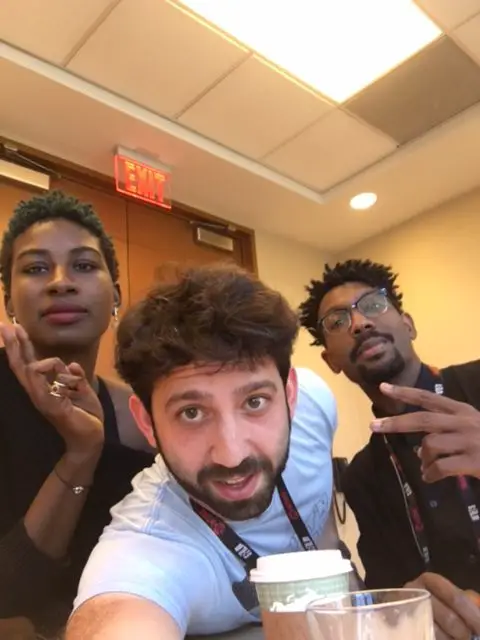
Whose Streets? comes out this Friday, Aug. 11. Find a showing near you at this website.
Does content like this matter to you?
Become a Member and support film journalism. Unlock access to all of Film Inquiry`s great articles. Join a community of like-minded readers who are passionate about cinema - get access to our private members Network, give back to independent filmmakers, and more.
Arlin is an all-around film person in Oakland, CA. He received his BA in Film Studies in 2010, is a documentary distributor and filmmaker, and runs Drunken Film Fest Oakland. He rarely dreams, but the most frequent ones are the ones where it's finals and he hasn't been to class all semester. He hopes one day that the world recognizes the many values of the siesta system.













